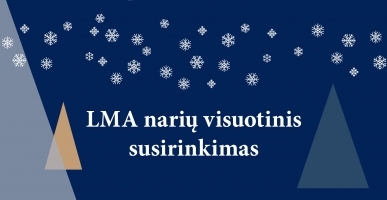Events
On the Eve of 2022:A General Assembly of the Members of the Lithuanian Academy of Sciences
24 12 2021
A festive general assembly of the members of the Lithuanian Academy of Sciences was held on 21 December 2021.
Professor Jūras Banys, President of the Lithuanian Academy of Sciences, reviewed the results of the year and the various activities of the academicians and the Academy as such. Despite the challenges of 2021, the organisation managed to persevere, with many memorable events having taken place. The president was pleased to note that the year 2021 saw the publication of science popularisation books by Lithuanian authors, members of the Academy. This tradition will be continued. It is worrying that the EU Structural Fund projects of science promotion and journal publishing are coming to an end, but it is hoped that activities will be extended next year.
The president’s address was followed by the honouring of the recipients of the Kaunas City Scientist Prize 2018. Egidijus Aleksandravičius, a professor at Vytautas Magnus University and a full member of the Lithuanian Academy of Sciences, received the prize for his active dissemination of thought in Kaunas and other significant work; the second recipient, Raimundas Šiaučiūnas, a professor at Kaunas University of Technology and also an academician, was awarded the prize for his scientific and expert activities in introducing innovative solutions to Lithuanian industry and implementing projects of the Santaka Valley. Andrius Palionis, the vice-mayor of Kaunas City Municipality, presented diplomas to the laureates, who were also congratulated by Prof. Jūras Banys and Prof. Zenonas Dabkevičius, vice-president of the Lithuanian Academy of Sciences.
At the beginning of his address, Prof. Aleksandravičius said that he had been reading Viktorija Daujotytė’s book on the philosophy of Arvydas Šliogeris when the news about this prize reached him. It was Šliogeris who became one of the laureate's mentors and friends and shaped his behaviour, style, and way of thinking. Prof. Aleksandravičius highlighted the danger of the state turning into a computing machine and the significance of humanism and meaningful thinking. The vital characteristic of the place we live in is having friends with whom we can think meaningfully. Another personality that influenced him was Vytautas Kavolis, who argued that scholars studying phenomena or objects must themselves change during the process. The third personality who changed Aleksandravičius's life and thinking was the physicist and writer Vytautas Almenas, who also emphasised the harmony between the sciences and other areas of human activity. In conclusion, the laureate wished the audience not to witness a future of boredom and futility.
Prof. Raimundas Šiaučiūnas, the second winner, is interested in the processes of production of different types of cement. For example, production of Portland cement, which is the most used globally, is highly polluting, emits large quantities of greenhouse gas, and is energy-intensive. In search for alternatives, Prof. Šiaučiūnas started developing the technology of concrete hardening in a carbon dioxide environment. One such eco-friendly alternative is non-hydraulic cements, the production of which is much more environmentally friendly. For example, much lower temperatures are used during the production process. Lithuania has sufficient raw materials for this, and the technological processes are easy to adapt. Production can also be organised in Kaunas.
The president and the vice president of the Lithuanian Academy of Sciences presented the certificates and the badges of Young Academy of the Lithuanian Academy of Sciences to ten scientists elected to the Young Academy in 2021. Established in 2018, the Young Academy has 40 members now and its formation is completed.
Next on the agenda of the assembly was the L'Oréal Baltic Women in Science award ceremony. They were congratulated by Ilona Sugintienė, Head of the L'Oréal Baltic Lithuanian Office, and Prof. Marija Drėmaitė, Secretary General of the Lithuanian National Commission for UNESCO. Ilona Sugintienė thanked the Lithuanian Academy of Sciences for the opportunity to congratulate the laureates. She said it was vital to promote science and research at this time. It also complies with the work of the company she represents because science is the source of innovative products. It is important to support not only science itself, but also to promote gender equality. That is why the company supports promising young women scientists and helps winners gain recognition. This year, L'Oreal is celebrating the fifth anniversary of this scholarship in the Baltic countries.
Prof. Drėmaitė expressed her satisfaction with this award and her hope that, like the natural sciences, the humanities and social sciences would also be recognised with this scholarship in the future. It contributes to overcoming the stereotypes that women cannot take advantage of equal rights. It is quite possible that soon the effort to fight for equal opportunities for men and women will seem like an anachronism because the problem will have disappeared.
The winners of the L'Oréal Baltic Women in Science Programme 2020 and 2021 are Dominyka Dapkutė, Rima Budvytytė, Joana Smirnovienė, and Ieva Plikusienė. Speaking on behalf of all the winners, Ieva Plikusienė emphasised that this award was not only an honour but also a responsibility. This programme contributes to public education. This is particularly important during a pandemic. She promised to encourage other women scientists to apply for this scholarship.
The last item on the assembly’s agenda was election of the chair of the Division of the Humanities and Social Sciences. The voting resulted in Vytautas Nekrošius being elected a member of the Presidium of the Lithuanian Academy of Sciences. The general assembly unanimously approved the full composition of the presidium, which is to start its work on 1 February 2022.
At the end of the meeting, the president of the Lithuanian Academy of Sciences expressed his hope that the pandemic would end in the coming year. He wished all the participants an enjoyable holiday season and new creative ideas and success in 2022.
Dr Rolandas Maskoliūnas and Dr Andrius Bernotas
Translated Diana Barnard
